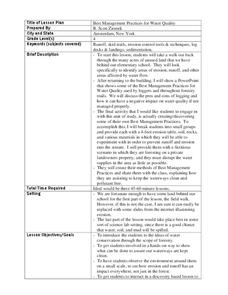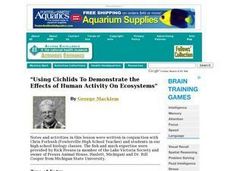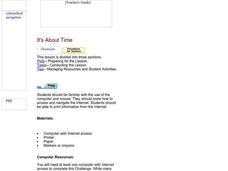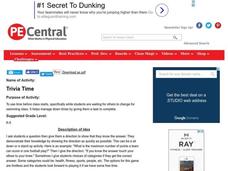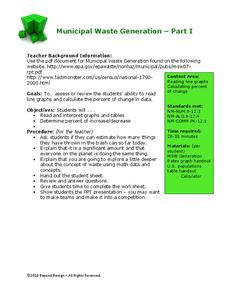Curated OER
Customizing A Microsoft Management Console
In this technology worksheet, students practice developing the skills of managing a computer network system and creating some of its configurations.
Curated OER
Best Management Practices for Water Quality
Fourth graders examine best management practices for water quality. In this water quality instructional activity, 4th graders explore unused land to identify areas of runoff, erosion, and effects of water flow. Students discuss logging...
Curated OER
Trash Flash Through Time
Students describe ways in which solid waste was disposed in the past and the present. They survey an older citizen about his/her solid waste disposal methods. They discover solid waste practices from long ago.
Curated OER
"Using Cichlids To Demonstrate the Effects of Human Activity On Ecosystems"
Students explore the freshwater ecosystem of Africa's Lake Victoria by creating a freshwater aquarium. They investigate factors affecting the aquarium's ecosystem and conduct lab activities.
Curated OER
It's About Time: Olympics, Winter Sports, Math, Media, Time Zones
Students use the Internet to determine broadcast times for the Winter Olympic Games snowboarding competitions. In determining these times, they need to consider time zones throughout the world.
Curated OER
Activity #5 Environmental Effects
Pupils explain the implications of particle theory of The Law of Conservation of Matter for problems of pollution and waste disposal. They describe, in terms of atoms and molecules, what happens to materials when they are dissolved or...
Curated OER
Trivia Time
Learners participate in a trivia game and follow directions during a down time.
Curated OER
Paper Airplane Activity
Ninth graders select and build one of five different paper airplane designs and test them for distance and for time aloft. Part of this activity is designed to explore NASA developed software, FoilSim, with respect to the lift of an...
Curated OER
Stress Dolls
Third graders compare responsibilities, opportunities and expectations of pioneer students to their own lives. They identify sources of stress and ways to alleviate stress.
PBIS World
Parent Questionnaire
Parents are an invaluable asset when it comes to getting to know the kids in your class. Ask them to fill out a short worksheet with questions about their children, including their strengths and weaknesses, how their child handles...
Curated OER
Curve Ball
Create a Height-Time plot of a bouncing ball using a graphing calculator. Graph height as a function of time and identify the vertex form of a quadratic equation that is generated to describe the ball's motion. Finally, answer questions...
Michigan State University
Create an Animal
Think beyond the animals and habitats we've already discovered and allow scholars to dream up their very own habitat and an animal that lives there. Class members present the new habitat and animal on a poster alongside an...
Curated OER
Nutria And The Disappearing Marsh
Young analysts examine changes in the nutria population, vegetation density, and marsh area over time in the wetlands of Louisiana. They import data and use the TI-73 Explorer to graph and analyze the effects of nutria on marsh loss.
Missouri Department of Elementary
Other Changes (Life-Changing Events Outside of the Family)
Change is inevitable. Kindergarteners discuss coping skills to properly manage changes that can occur outside the family. Scholars reflect on their life changes after starting kindergarten. They discuss their feelings and draw a...
Michigan State University
Preferred Destinations
Pests vacation, too! Here, scholars create travel brochures or posters that inform others about a habitat in which a pest lives. Travel information to be included contains everything from pictures to resort names to slogans down to the...
Beyond Benign
Municipal Waste Generation
Statistically, waste may become a problem in the future if people do not take action. Using their knowledge of statistics and data representation, pupils take a look at the idea of waste generation. The four-part unit has class members...
Curated OER
Playing Psychologist
Students, in groups, research one of the following: Bipolar Disorder, Depression, Anxiety Disorder, Obsessive Compulsive Disorder, Posttraumatic Stress Disorder, Dissociative Identity Disorder, Schizophrenia, and any other disorders that...
Nemours KidsHealth
Empathy: Grades K-2
Second graders read articles about being afraid, dealing with anger and apologizing. For this feelings lesson, 2nd graders read articles and discuss the feelings they have. Students describe their feelings and how to be supportive of...
Curated OER
Paul Robeson: 20th-Century Renaissance Man, Hero In Any Century
Students study the life and times of actor Paul Robeson. In this social activism activity, students research primary and secondary documents to create multi-media presentations featuring Paul Robeson's life and political activism.
Curated OER
Let's Make a Compost Cake
Students create a compost cake. For this gardening and decomposition science lesson, students review and describe the "nutrient cycle." Students create a compost pile, measure and record the dimensions and temperature of the pile, and...
Curated OER
Where's King Solomon when we need him?: Good decisions on resources
Students use geographic information to suggest how to manage natural resources through a simulation. They engage in a simulation, and decide how to protect, allocate, and exploit the resources of a hypothetical location.
Curated OER
Making Your Own Master Calendar
Ninth graders discuss time demands such as homework, family, and chores that occupy their free time. They discuss how to effectively manage their time. They write important information and activities on a calendar. They develop and...
Curated OER
History of Garbage
In this history of garbage worksheet, students read about the history of garbage from prehistoric times through the 1900s. Students learn about the how waste is managed in Palm Beach County.
Curated OER
Improving Discussion Lessons
Students participate in group activities to stimulate group discussions. They respond to statements by listening, reacting, reading, and modifying them. They discuss the statements of their group and listen to those created by the other...



